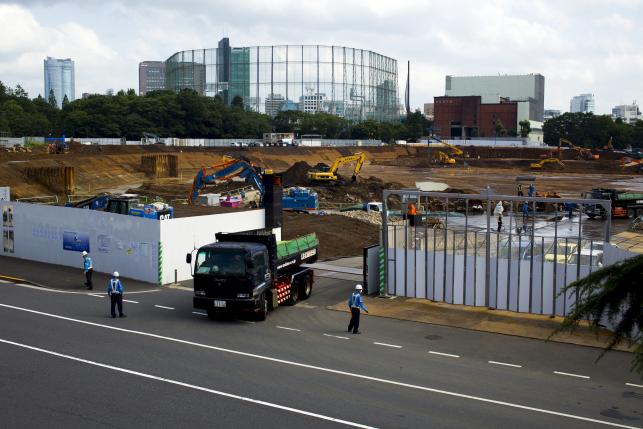Japan to scrap Olympic stadium plans, start over
TOKYO: Japanese Prime Minister Shinzo Abe announced on Friday the scrapping of a plan for a controversial national stadium, the centrepiece of the Tokyo 2020 Olympics, after sky-rocketing costs sparked public outrage.
Anger over the stadium, the estimated cost of which had climbed to $2.1 billion, almost twice its expected cost when Tokyo won the bid for the Summer Games in 2013, had become a liability for Abe as he pushes unpopular defence bills through parliament.
The new National Stadium was also meant to have been the centrepiece of the 2019 Rugby World Cup.
Support for Abe, who returned to office in 2012 pledging to bolster defences and reboot the economy, has slipped to about 40 percent on voter doubts about the defence legislation. News about the stadium has fed into that discontent.
"We are scrapping our plans for the stadium, and starting from zero," Abe told reporters after meeting Olympics Minister Toshiaki Endo and Education Minister Hakubun Shimomura.
Referring to the furore over the cost, Abe said: "The Olympics are a party for our people, and they and the athletes, each one of them, are the main players. We need to make it something that they can celebrate."
Tokyo won the Olympics on a reputation for getting things done, but immediately ran into problems with costs and a roll back of some promises, such as keeping most sports venues within 8 km (5 miles) of the Olympic village.
The stadium, designed by British-based architect Zaha Hadid and likened to a bicycle helmet, has been criticised as expensive, grandiose and unsuited to the site, where a stadium built for Tokyo's 1964 Olympics stood until it was demolished recently.
Abe said that new arrangements would have to be made as soon as possible. But he made no mention of costs and whether this meant another competition for a design, or if another design from a 2012 competition would be used.
Though scaling back stadium plans is not uncommon and happened for the London 2012 Games and Sydney 2000 Games, changing plans entirely at this stage is unusual.
Officials had previously said changing the design would damage Tokyo's reputation.
Media said the Rugby World Cup would be held in an existing stadium, and the government was aiming to keep costs for the new stadium to about 180 billion yen ($1.45 billion).
The stadium was originally estimated to cost 130 billion yen, but last year estimates rocketed to 300 billion yen. Last month, the government put the cost at 252 billion yen ($2.03 billion).
Political experts said the stadium decision was aimed at bolstering support hit by the furore over the security legislation, which includes changes that would allow Japanese troops to fight overseas for the first time since World War Two.
Tens of thousands of people have protested against the legislation, which was approved by parliament's lower house on Thursday.
"It's pretty blatant," said Steven Reed, a political science professor at Chuo University. "It's a wise play, but whether it will work or not is hard to tell."
Landing the Olympics added lustre to Abe's administration, but plans quickly bogged down. The demolition of the old stadium was delayed and organisers broke promises to keep most venues close to the Olympic Village.
Jim Heverin, the project director for Zaha Hadid Architects, said in a statement that the escalating costs were not design-related.
"It is not the case that the recently reported cost increases are due to the design, which uses standard materials and techniques well within the capability of Japanese contractors and meets the budget set by the Japan Sports Council," Heverin said.
"The real challenge for the stadium has been agreeing an acceptable construction cost against the backdrop of steep annual increases in construction costs in Tokyo and a fixed deadline."






